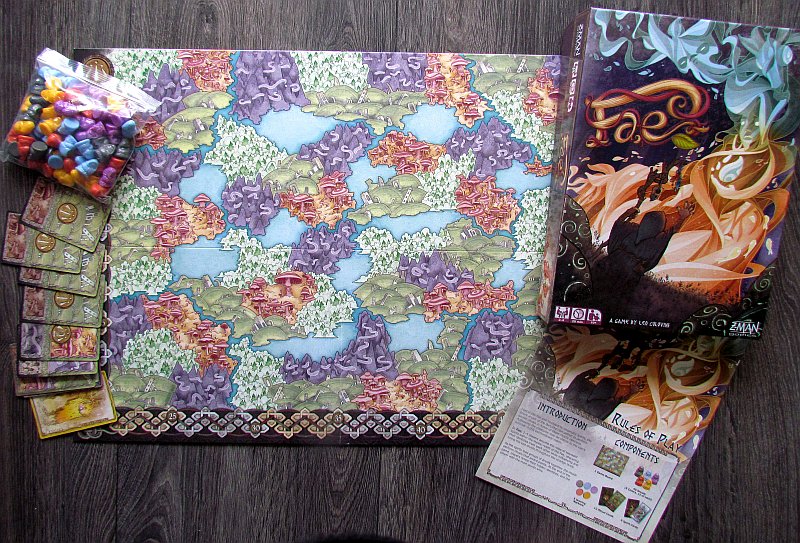In the distance, in a meadow, I saw beautiful creatures whose flowing robes danced in the wind. At first, naively, I thought they were fairies. I was about to discover that fairies only exist in stories. Lost in my reverie in the middle of the open space, other silhouettes emerged from behind the trees. They tied me up and started preparing for a ritual. The hallucinations disappeared as if by magic. But it was too late to run away.
I have just entered a magical land full of druids and spirits, the land of the Fae. The game FAE is a re-implementation of the popular Clans. It was launched in 2002 and now it reappears with a new guise.
The elongated box intrigues with its appearance dominated by the ethereal creatures of the mystical land of fae. Inside it is a large board filled with pictures in a picturesque style, which divide the map into several smaller areas. It has a scoreboard around it and players use round tokens to mark the score. They don't belong to the players themselves, but rather to clans, whose druids are randomly scattered across 60 free areas. Each participant receives a card that cannot be revealed, which designates one of the clan colors. Next to the board, place a pile of ritual cards. Then the game can begin.

In turn-by-turn play, players must move a druid (then a group of druids) to an adjacent space. The druids look for each other, trying to reunite. Therefore, players cannot travel to an empty territory. The druids gradually come together and create larger groups. Players alternate actions each turn.
This tranquility, however, is broken when one of the groups of druids is surrounded only by empty spaces. In that case, they stop looking for other friends, the ritual begins, and the player reveals the top card of the ritual pile. This can cause the ritual to be interrupted if the forces of this world do not want them to act on that terrain. Thus, druids do not earn any points for their players. Otherwise, if it doesn't, each druid involved in the ritual will give their clan a point. Players move tokens on the point counter according to the proper score and resolve bonuses if the ritual is performed on holy ground (if the second part of the revealed card shows favorable ground).

The game ends when all ritual cards are used up (twelve scores) or if it is no longer possible to move any pieces. It is only at that moment that the players reveal their colors, which until then were secret, and determine the winner, whose clan managed to get the furthest in the score.
Author Leo Colovini is the master of area movement and control games. In fae, again, it proves that it is possible to achieve brilliant potential behind simplicity. It's just about moving druids around to get as many points as possible for their colors.
But good planning, done arbitrarily, can be shaken by luck. If you accidentally gather the druids on a cursed ground, no points will be gained. Until then, they can be freely moved around the map. The only way to stop the movement is to increase the group of druids to seven or more. In this case, groups can no longer be moved, but can still be supplemented by other druids from adjacent territories.

Fae is a great game for beginners and serves as a good and quick filler for the more experienced ones. There are no tricks in it, and besides, the secret affection element is an extremely interesting parameter for beginners. Among less experienced players, Fae can easily come to the table multiple times.
The game is pretty fast and doesn't take much longer than 30 minutes, even with multiple players. The secrecy factor generates unexpected situations and players need to adapt. Furthermore, chances are that by moving a color that is not yours, you will be helping an opponent, not simply moving a neutral color.
Fae has a different look, and it fits well into the abstract category. It's a simple game, but with a good strategy and a hint of surprise, and it entertains both beginners and more experienced players at the same table.
Features:
- great for beginners
- great progress
- pleasant simplicity
- short game time
- secret affection system

Translated and adapted from: http://www.deskovehry.com/en/review-fae-bloodthirsty-fairies/





